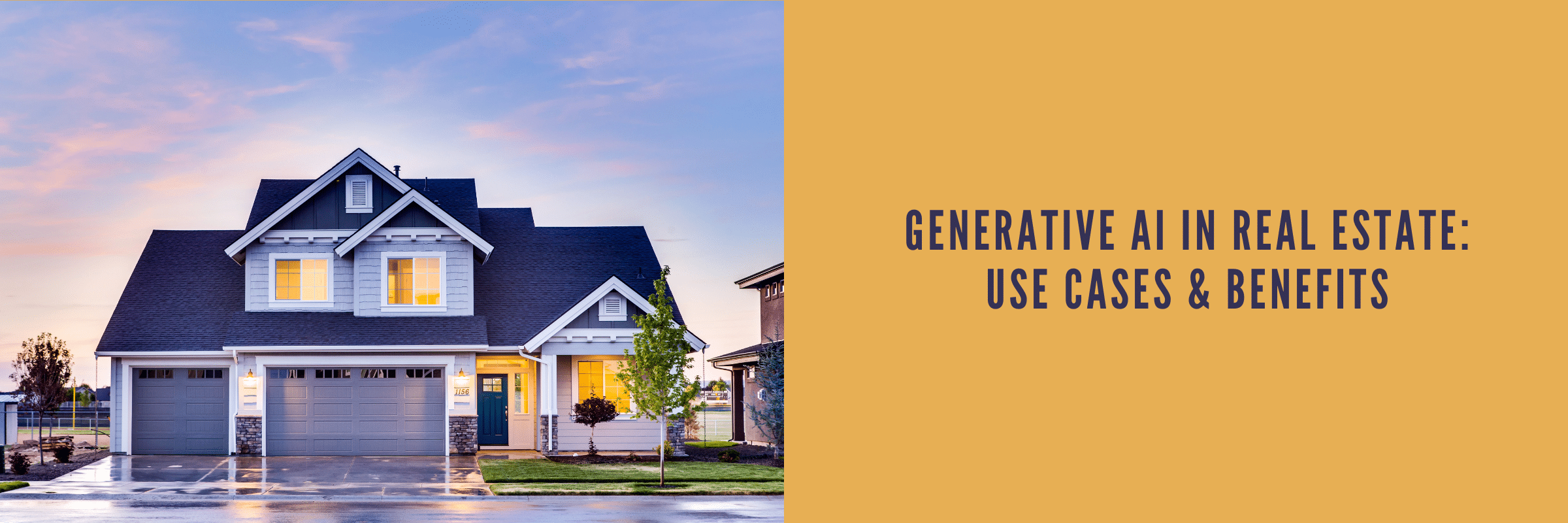
Generative AI in Real Estate: Use Cases & Benefits
Manu Jain | August 29, 2024 , 12 min read
Table Of Content
Artificial Intelligence has transformed the real estate industry by changing how appraisers, mortgage lenders, developers and homeowners work.
AI’s impact on real estate is broad, including analytics that aids investment decisions and automation that improve customer experiences.
Automated Valuation Models (AVMs) powered by AI have introduced a new competition for appraisers, offering property valuations based on data and digital imagery. Mortgage lenders now rely on AI-driven risk assessments for underwriting decisions, while developers use AI platforms to identify construction sites with insights into hyperlocal zoning regulations.
AI has also streamlined workflows for realtors, although some argue it has reduced job opportunities. AI-driven platforms can generate personalized property recommendations for clients, while AI bots sift through leads to uncover hidden opportunities.
As AI becomes more prevalent in real estate, industry professionals are grappling with questions about its value, practical applications, and the pace of GenAI adoption.
Key Takeaways
- AI is revolutionizing real estate by enhancing investment decisions, automating processes, and improving customer experiences.
- Mortgage lenders use AI for risk assessment, streamlining underwriting decisions and improving accuracy.
- Developers leverage AI to identify construction sites and analyze hyperlocal zoning regulations.
- Generative AI is transforming property marketing through virtual staging, interactive tours, and 3D modeling.
- AI-driven platforms personalize property recommendations and help realtors uncover hidden opportunities from leads.
- While AI boosts efficiency, it raises concerns about job displacement and technology adoption in real estate.
What is Generative AI in the Real Estate Industry?
Generative AI in the real estate industry refers to using artificial intelligence technology to create new and original content, such as images, videos, or text, that is indistinguishable from content created by humans. This technology can enhance various aspects of the real estate business, including property marketing, design visualization, and customer engagement.
For example, generative AI can create realistic 3D models of properties based on architectural plans, allowing developers and architects to visualize projects before they are built. It can also generate virtual tours of properties, giving potential buyers a realistic sense of the space without having to visit the property physically.
Benefits of Using Generative AI in Real Estate
Generative AI has so much to offer in the real estate space. Let’s look at few:
1. Automated 3D Property Modeling
Generative AI can generate detailed 3D models of properties from 2D-floor plans or images. This allows developers and architects to visualize designs more effectively. For example, an AI-powered platform called “Archistar” can create 3D models of buildings in minutes, significantly reducing the time and cost of traditional modelling methods. According to Archistar, their platform has reduced the time to create 3D models from weeks to minutes, leading to a 90% reduction in modelling costs.
2. Virtual Staging
Generative AI can digitally furnish and decorate empty rooms in property photos, helping buyers visualize the potential of a space. Virtual staging has led to a 75% increase in property inquiries and a 50% decrease in time on the market for staged properties.
3. Interactive Property Tours
Generative AI can create interactive 3D tours of properties, allowing potential buyers to explore every corner of a property online. Matterport is a leading provider of AI-powered virtual tour services for real estate. Properties with 3D tours receive 49% more qualified leads and sell on average 10% faster than properties without 3D tours.
4. Optimising Architectural Design
Offering datasets to the generative AI can assist in automating the creation of multiple building layouts that primarily optimize space utilization. Using Generative AI in the real estate sector can also assist in developing 360° visualizations of suggestive architectural designs to measure whether they reduce cost. Likewise, it can also be used to check the sustainability of the construction and its environment.
5. Enhancing Property Management
Generative AI’s application in real estate can streamline property management by performing maintenance scheduling through automation. It can also assist with identifying improvement areas by processing tenant communications and feedback, along with property performance data. Such uses ultimately make property management relatively simpler and more effective.
6. AI-Driven Marketing Strategies
The various applications required to bring visibility to your real estate can be accessed by using generative AI. It will serve to analyze customer behavior, property data, and market trends to create personalized campaigns that resonate with the market. Parallelly, generating targeted content with optimized ads can enhance engagement and increase conversion rates.
Ready to Optimise Your Real Estate Operations?
Adopt AI-powered tools to streamline workflows, boost productivity, and improve overall efficiency.

Challenges and Considerations for Using Generative AI in Real Estate
Despite the numerous benefits, organizations must address challenges and considerations when implementing generative AI. Here are a few outlined:
1. Data Quality and Availability
Generative AI models require large amounts of high-quality data to produce accurate results. Ensuring the availability and quality of relevant data, such as property images and floor plans, can be challenging, especially for smaller real estate firms.
2. Model Complexity and Training
Developing and training generative AI models can be complex and time-consuming. Organizations need skilled data scientists and AI engineers to create and maintain these models, which can be costly.
3. Ethical and Legal Considerations
Using generative AI for property valuation or design tasks raises ethical and legal concerns. Organizations must ensure that their AI models are fair, transparent, and compliant with data privacy regulations.
4. Cost Considerations
Developing and implementing generative AI solutions can be expensive, especially for smaller real estate firms. Organizations must carefully consider the cost-benefit ratio of using this technology.
5. User Acceptance and Adoption
Real estate professionals and clients may hesitate to adopt generative AI technologies due to concerns about job displacement or mistrust of AI-generated results. Organizations must educate and train their stakeholders to increase acceptance and adoption.
Case Study: Examples of Generative AI in Real Estate
The case studies below showcase some examples of how generative AI is being used in the real estate industry to drive change and create new opportunities for growth. Generative AI is changing the game for real estate professionals. This could be you or your real estate business soon:
Case Study 1: Archistar
Archistar is a leading provider of generative AI solutions for the real estate industry, specializing in automated 3D modeling. The company’s platform allows developers and architects to quickly generate detailed 3D models of properties from 2D floor plans or images. This has revolutionized the design process, enabling professionals to visualize and iterate on designs more efficiently.
Since implementing generative AI, Archistar has seen significant progress in several key areas:
- Time and Cost Savings: Archistar’s platform has reduced the time to create 3D models from weeks to minutes, leading to a 90% reduction in modeling costs for their clients.
- Improved Design Accuracy: The use of generative AI has improved the accuracy of design visualizations, helping developers and architects make more informed decisions about their projects.
- Enhanced Customer Satisfaction: Clients using Archistar’s platform have reported higher levels of satisfaction with the design process, thanks to the ability to quickly see and understand their projects in 3D.
Case Study 2: Zillow
Zillow, a leading online real estate marketplace, has successfully implemented generative AI to improve its property recommendation system. By analyzing user behavior and preferences, Zillow’s AI algorithms can recommend properties that are more likely to match a user’s criteria, leading to higher user engagement and conversion rates.
Since adopting generative AI, Zillow has achieved notable progress:
- Increased User Engagement: Zillow’s personalized property recommendations have led to a 35% increase in user engagement, as users are more likely to find relevant properties that meet their needs.
- Higher Conversion Rates: The AI-powered recommendation system has also resulted in a 15% increase in property inquiries, indicating that users are more likely to take action on recommended properties.
- Enhanced User Experience: By providing more relevant and personalized recommendations, Zillow has improved the overall user experience on its platform, leading to higher levels of customer satisfaction.
Conclusion
The case studies of Archistar and Zillow demonstrate the transformative impact of generative AI in the real estate industry. From improving design visualization and personalizing property recommendations to increasing user engagement and conversion rates, generative AI is reshaping the way real estate companies operate and interact with their customers. As the technology continues to evolve, we can expect to see even more innovative applications of generative AI in the real estate industry, further enhancing efficiency, effectiveness, and user satisfaction.We have conducted a significant amount of work in the real estate industry. To learn more about what we can offer to help grow your real estate business using Generative AI services, please take a look at our case study. Don’t hesitate to contact us, and let’s work together to implement innovative ideas in your existing business.
Frequently Asked Questions (FAQs)
Q: What are some future trends of generative AI in real estate?
Some future trends in generative AI for real estate include:
- More advanced 3D modeling and virtual reality technologies for immersive property experiences.
- Enhanced data analytics for more accurate property valuations and market predictions.
- Increased use of AI-powered chatbots for customer service and property inquiries.
- Integration of generative AI with other emerging technologies, such as blockchain, for secure and transparent real estate transactions.
Q: How is Gen AI used in real estate?
Gen AI in real estate is used to automate 3D modeling, virtual staging, and interactive tours which in turn enhances property showcasing and design visualization. It also optimizes architectural designs and streamlines property management to help the industry innovate. For professionals, it can provide analysis of customer behavior, property data, and market trends to create personalized marketing campaigns.
Q: Can generative AI help in property valuation?
Yes, generative AI can assist in property valuation by analyzing various factors such as location, size, amenities, and market trends to provide accurate property valuations. This can help real estate professionals and investors make informed decisions about buying or selling properties.
Q: How can generative AI improve the customer experience in real estate?
Generative AI can improve the customer experience in real estate by providing personalized property recommendations, realistic property visualizations, and interactive property tours. This can help buyers find properties that meet their specific needs and preferences, leading to higher satisfaction and loyalty.
Similar Articles Around Generative AI
Related Blogs

OpenAI for Businesses [Benefits, Use Cases & Challenges]
Discover the benefits of OpenAI for businesses. From reducing costs to scaling operations and enriching customer experiences. Real-world use cases included.
ScaleupAlly Team
Dec 16 ,
11 min read

Best 11 Agentic AI Tools in UAE: Accelerating Digital Transformation
Discover the top 11 agentic AI tools in UAE for 2025. Explore features, benefits, and tips to choose the right AI tool for your business growth.
Manu Jain
Nov 6 ,
9 min read

How to Choose an AI Development Company in Dubai: A Complete Guide
Find out how to choose the right AI development company in Dubai. Learn key factors, local considerations, and tips to select the best partner.
Manu Jain
Nov 6 ,
9 min read



